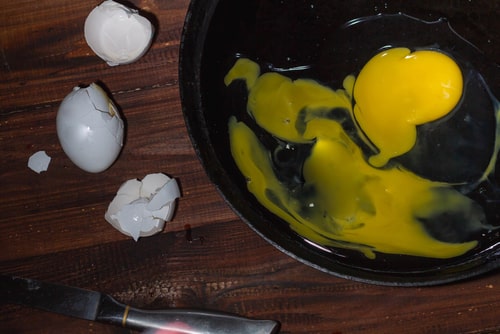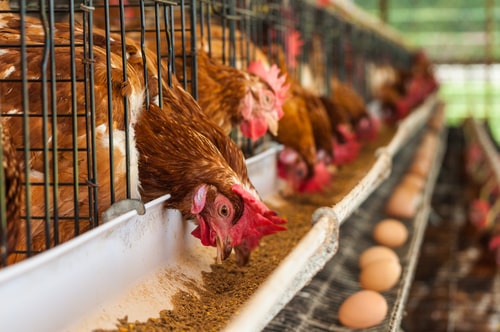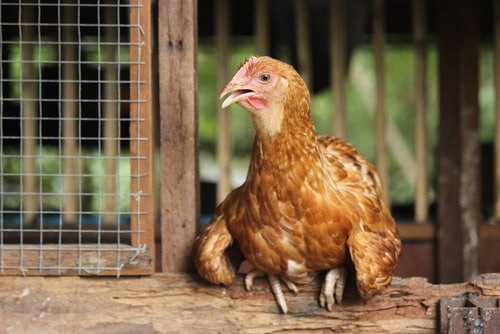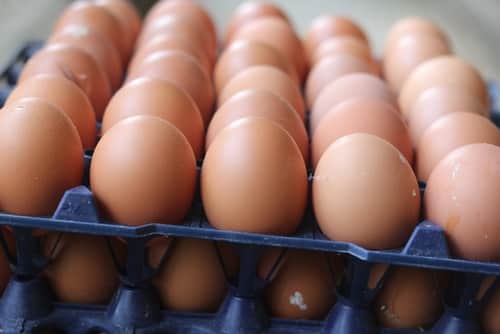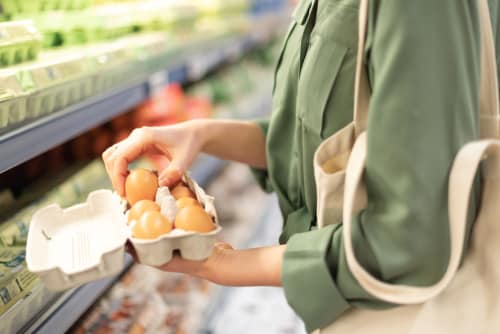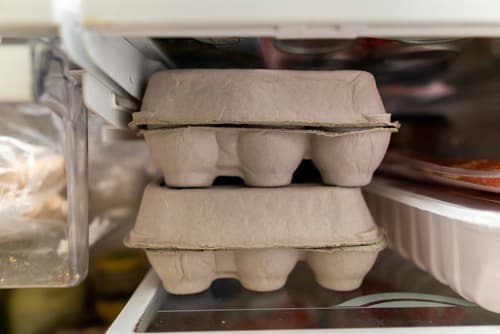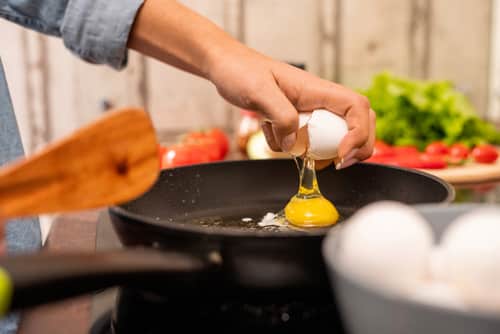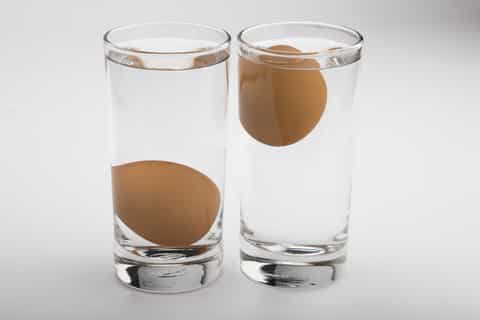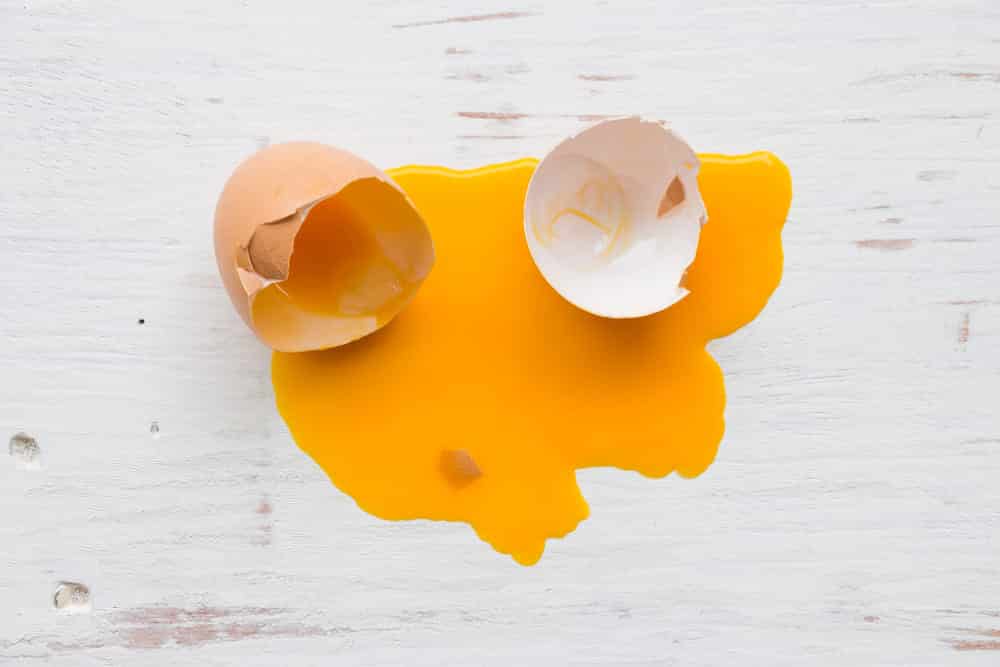
Egg yolks contain not only cholesterol but also essential nutrients such as vitamins A, D, E, and K, and omega-3 fats. They also contain folate and vitamin B12. The protein in both the white and yolk is bio-available so eggs are a wonderful protein source.
On top of all this, egg yolks are a great source of choline, an essential ingredient in one of the brain’s neurotransmitters, acetylcholine-1. So, the yolks are definitely not something you want to be tossing out.
Some worry about the cholesterol in them but unless you are eating huge numbers of eggs, this should not be a problem. Apart from being extremely nutritious, egg yolks are very tasty.
Some of you may be wondering what to do with the eggs that you open and the yolk is broken. Suppose you pick an egg to make a fried egg with and as soon as you crack the egg, the yolk breaks and starts to spread all over the pan…
This has happened to me many times and I have also wondered if the eggs are still fresh enough to use.
There are several reasons for the egg yolk to break as soon as you crack the eggshell and pour it into the pan. Read on and we’ll explore why this happens and if the egg is still safe to eat
Why Does Egg Yolk Break Down Easily When You Crack The Egg?
Here are some possible reasons:
1. Low Protein Diet
One of the main reasons for egg yolks to break apart so easily is the weak protein content in the egg yolk’s membranes.
Since the membranes are made from protein, when a hen isn’t given a proper high protein diet, the eggs she lays will be weak and have fragile yolks.
When the hen’s body doesn’t absorb enough protein, her eggs are not robust and the yolk breaks as soon as it is opened.
2. Stress Or Molding
Environmental and physical stress makes a hen lay poorly formed eggs. Stress to the hen’s system produces very weak and unstable eggs.
These stresses may include overcrowded living conditions, poorly controlled temperatures in the hen’s environment, insufficient food or water, or poor-quality food.
3. Weather
Chickens are very sensitive to extremes of temperature. This is why many farms use heaters or air conditioners in the hen houses to control the temperature.
4. Old Eggs
When eggs become stale, their yolks absorb the outer water content. This makes the yolk membrane weaker and weaker causing it to break more easily than usual.
Fresh eggs have the best and most stable egg yolks.
5. Rough Handling
When the eggs are roughly handled, the internal membranes become weak and prone to breakage.
Is It Okay To Eat Eggs With Broken Yolk?
Tips For Protecting Your Egg Yolks from Breakage
- Purchase your eggs from a reputable supplier. Look for organic free-range (pastured) eggs because usually these hens will have been cared for in optimal conditions so will produce the best and healthiest eggs. You may have to pay a little more, but you can be sure they are best for your health and will last longer in the fridge.
- If you raise your own chickens, make sure to add proper protein content to the hen’s diet. You can supplement their feed with mealworms, fresh pumpkin seeds, parsley, or Japanese millet.
- Handle the eggs carefully if you buy them from the market and try not to shake them around too much. Treat them as fragile because they are!
- Always check the sell-by date on the box and buy the freshest eggs possible. Try to consume the eggs as soon as possible before they pass their expiry date. You can store fresh eggs for up to six weeks as long as they’re in the fridge in their carton.
- Don’t freeze the eggs unless you are going to open them, beat them, and freeze them in that form for baking or omelets.
- Keep the eggs in the fridge with the pointy side down. This will keep the yolk in the center. Try to store them in their original carton in the fridge as the carton prevents excessive moisture loss. It will also prevent the porous shell from absorbing odors and flavors from other items in the fridge.
- For frying, try to use fresher eggs because they hold their shape well and the yolks tend not to break. Use older eggs for omelets, scrambling, and baking.
How to Tell if Eggs Are Fresh
- To test for freshness, drop an egg (gently!) into a bowl of water. A fresh egg will sink to the bottom and lie on its side but a bad or old egg will float to the top because an air pocket forms inside the shell. Discard the eggs that float to the top.
- Smell the egg. A fresh egg will not smell at all but a stale one will have an unpleasant “sulfur” smell. If you’re unsure, break it into a saucer and smell it again. If you detect any odor, throw the egg away.
- If the white is very runny and the yolk breaks, the egg is probably not fresh and should be discarded.
That’s it. To sum up, if your egg is fresh and the yolk breaks, it is safe to consume. However, a broken yolk and runny white are signs that the egg is old and should be thrown away.
